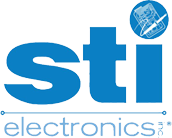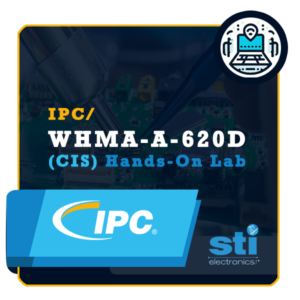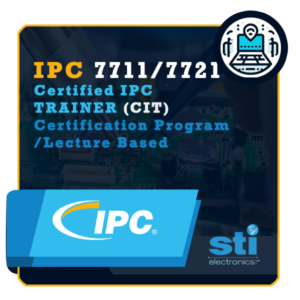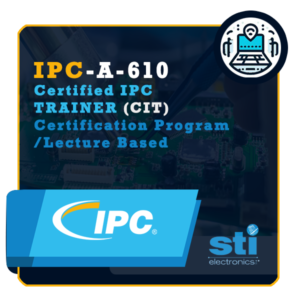This program provides an in-depth look at the J-STD-001 document. The course reviews this document and helps students learn how to interpret the criteria. Section 1 is an introduction to the process requirements of J-STD-001, Section 2 focuses on wires and terminals, Section 3 covers PCB, Coating, Encapsulation and Staking, Section 4 emphasizes Through-Hole Technology, Section 5 emphasizes Surface Mount Technology and Section 6 focuses on Inspection, Inspection Methodology, and Process Control. Open book and closed book exams are. Sections 2, 4 and 5 include hands-on training. Recertification required every 2 years. CIT’s are qualified to teach Certified IPC Application Specialist (CIS) training and certification programs.
This program provides an in-depth look at the J-STD-001 document. The course reviews this document and helps students learn how to interpret the criteria. Section 1 is an introduction to the process requirements of J-STD-001, Section 2 focuses on wires and terminals, Section 3 covers PCB, Coating, Encapsulation and Staking, Section 4 emphasizes Through-Hole Technology, Section 5 emphasizes Surface Mount Technology and Section 6 focuses on Inspection, Inspection Methodology, and Process Control. Open book and closed book exams are. Sections 2, 4 and 5 include hands-on training. Recertification required every 2 years. CIT’s are qualified to teach Certified IPC Application Specialist (CIS) training and certification programs.
This program is for anyone needing to renew their existing J-STD-001 CIS Certification. The CIS program is modularized to allow for maximum flexibility in meeting individuals training needs. Module 1 is an introduction to the process requirements of J-STD-001, Module 2 focuses on wires and terminals, Module 3 covers printed circuit boards, coating, encapsulation and staking, Module 4 emphasizes through-hole technology and Module 5 emphasizes surface mount technology and Module 6 focuses on inspection, inspection methodology, and process control. Open book exams are required after each module. Modules 2, 4 and 5 include hands-on projects.
J-STD-001 Space Cert or Recert: There are no workmanship requirements for this module. Only CIS’s or CIT’s who have successfully completed the J-STD-001 Certification or Recertification Course can attend.
This course provides additional requirements over those published in IPC J-STD-001 to ensure the reliability of soldered electrical and electronic assemblies that must survive the vibration and thermal cyclic environments getting to and operating in space. Only CIT’s who have successfully completed the J-STD-001 Certification course can attend.
The J-STD-001 Space Electronics Hardware Addendum provides additional requirements over those published in IPC J-STD-001 to ensure the reliability of soldered electrical and electronic assemblies that must survive the vibration and thermal cyclic environments experienced while traveling and operating in space. This program consists of a lecture which will identify and review each section of the addendum, followed by an open book exam. There are no workmanship requirements for this module. Only CIS’s who have successfully completed the J-STD-001 Certification/Recertification Course can attend.
J-STD-001 Space Cert or Recert: There are no workmanship requirements for this module. Only CIS’s or CIT’s who have successfully completed the J-STD-001 Certification or Recertification Course can attend.
IPC has developed an 8-hour hands-on lab based on the IPC/WHMA-A-620’s acceptability requirements. This hands-on lab covers cable and harness fabrication from stripping and tinning of wires to crimping of contacts while reinforcing the acceptability requirements for all classes of product. Upon completion of this course the student will receive an IPC certificate of completion.
Only CIS’s or CIT’s who have successfully completed the IPC/WHMA 620 Certification or Recertification Course can attend.
This retraining course provides instruction to those who are responsible for building or inspecting electrical cables and harnesses per NASA-STD-8739.4, Crimping, Interconnecting Cables, Harnesses, and Wiring. Topics include wire and cable preparation, connector contact preparation and installation into connectors, crimp ring and backshell installation, installation of splices, installation of grounding wires, harness manufacturing techniques, quality control practices, and quality assurance measurements. All of the requirements contained in the standard are discussed. STI has SMA-Sponsored Level B instructors to the NASA-STD-8739,4. Note: NASA-STD-8739.6 “Implementation Requirements for NASA Approved Workmanship Standards” it states: 5.2.2 SMA-Sponsored Level B instructors may train operators and inspectors inside and outside of their own organization as well as U.S. government civil service personnel (NASA and non-NASA).
ATTN: Retraining courses require an eye exam to be submitted prior to attending class. To participate in an Operator/Inspector retraining class the student must have previously completed the Initial training and have a current certification.
This class provides skill-based training regarding rework, repair and modification procedures covered in the IPC-7711 and IPC-7721 documents. This is a hands-on course. Section one is mandatory and consists of Common procedures. Sectionos 2-10 consist of; Wire Splicing Procedures, Conformal Coating, Through Hole component removal and installation, Chip and MELF removal and installation, Gull Wing removal and installation, J-lead removal and installation, BGA (Lecture only/Optional), Laminate Repair, and Circuit Repair. An open book and closed book exam is required. Recertification is required every 2 years.
This course provides training for operators who will build or inspect hardware to NASA-STD-8739.1, Polymeric Applications. Topics include staking, conformal coating, potting, and bonding. Practical exercises include demonstrating inspection techniques for these polymeric material applications and demonstration of students’ competency for using these techniques in a manner that produces hardware that meets the requirements of the standard. STI has SMA-Sponsored Level B instructors to the NASA-STD-8739.1. Note: NASA-STD-8739.6 “Implementation Requirements for NASA Approved Workmanship Standards” states: 5.2.2 SMA-Sponsored Level B instructors may train operators and inspectors inside and outside of their own organization as well as U.S. government civil service personnel (NASA and non-NASA).
ATTN: Initial training courses require an eye exam to be submitted prior to attending class.
The CIT program utilizes the images in the IPC-A-610 inspection document to provide visual accept/reject criteria examples for all three classes of assembly production (Tin/Lead and Lead Free). The sections include the following topics general information, foreword, applicable documents, handling, soldering and high voltage, component damage & PCBAs, terminals connections, through-hole technology and jumper wires, surface mount assemblies & jumper wires, and hardware. Upon completion of this class, students will be familiar with the IPC-A-610 acceptability criteria for all three classes of products and be able to apply this criterion to internal quality functions. An open book and closed book exam is required. CITs are qualified to teach Certified IPC Specialist (CIS) training. Recertification is required every 2 years.




